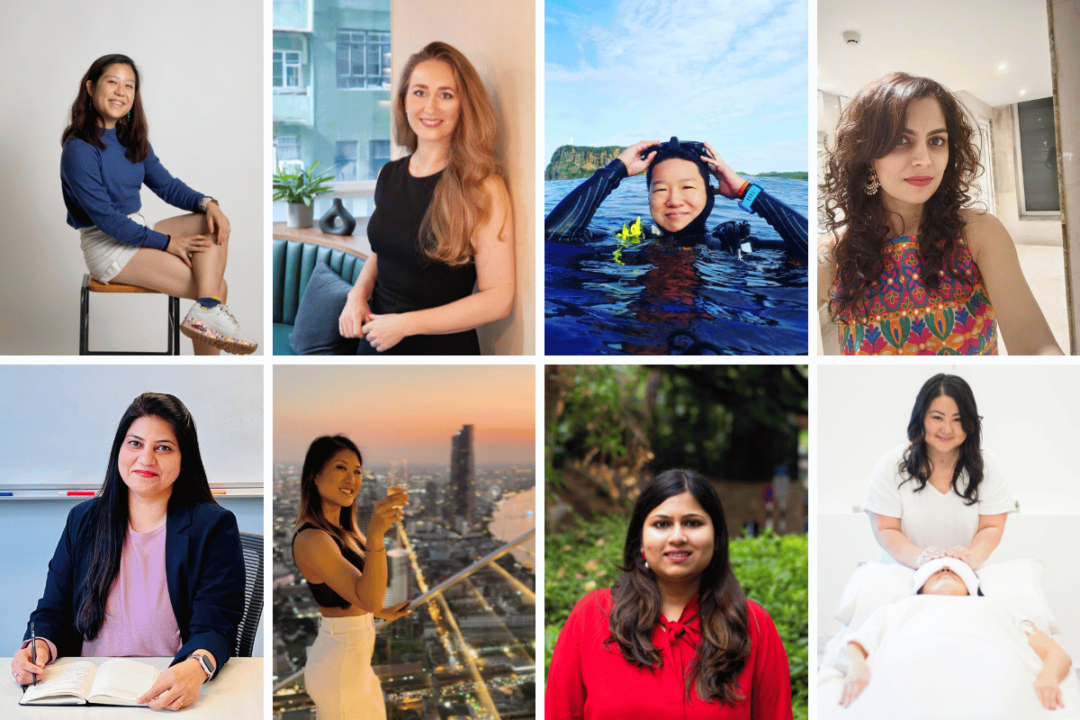March is Women’s History Month, with International Women’s Day on March 8. This year, we wanted to highlight some exceptional ladies that are working to improve the well-being of women across Hong Kong. The dimensions of wellness help break down the areas in our life that we can work towards building and thereby creating rich and fulfilling lives. While we might normally consider only physical or mental well-being, there are a total of EIGHT interconnected dimensions that can improve your quality of life. So read on and learn how to improve your life, inside-out!
Juliette Eav — Physical well-being
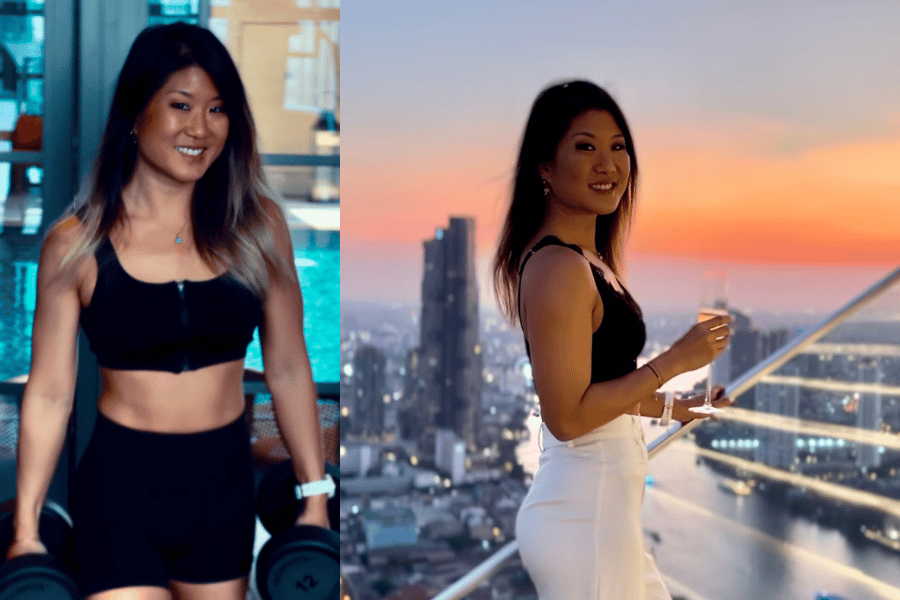
Juliette is a 36-year-old French born Chinese who has been working in Hong Kong for nearly 10 years in digital marketing. She is a health and fitness enthusiast who loves cooking. She started her fitness journey two years ago. From learning how to build healthier dietary habits and being completely new to weight training, she is now certified as a nutritional coach (PN1) and lifting weights became an integral part of her lifestyle. She shares healthy recipes of world cuisines on her Instagram account @fit_chef_ju, aiming to inspire people in their physical health journey and proving that eating clean is not boring.
What is physical well-being?
Physical well-being is about taking caring of your body in a way that it is functional for your daily activities by improving your endurance, strength, flexibility, and mobility through movements and exercises. It is also about preventing undue fatigue, chronic pains, and illness by getting proper nutrition, adequate quality sleep, and hydration to help keep a balanced hormonal system, strong immunity, and a healthy gut.
How can women attain physical well-being?
There are several aspects to look at. The key is to build sustainable healthy habits and to be consistent. As women, we experience more hormone imbalances throughout our life (pregnancy, menstrual cycle, and menopause), and in that matter, we should pay more attention and listen to our bodies to address the related symptoms. To prevent them and to attain physical well-being:
- Get enough sleep. Sleep is the most important dimension of physical health yet so underrated. It is not only about quantity but also about the quality.
- Move often. Regular exercises and movements (ideally, at least 30 minutes a day) can powerfully affect how your body functions. It can be as simple as walking but I strongly recommend resistance training. Women usually think that lifting weights is going to make them bulky but it’s a huge misconception. In fact, it is the most efficient way to tone our body and stay healthy.
- Fuel your body with a well-balanced and minimally processed diet (at least 80% whole foods) with a source of protein in every meal.
- Drink plenty of water (at least 1.5 L daily).
How to contact Juliette Eav: Instagram.
Stephanie Ng — Emotional well-being
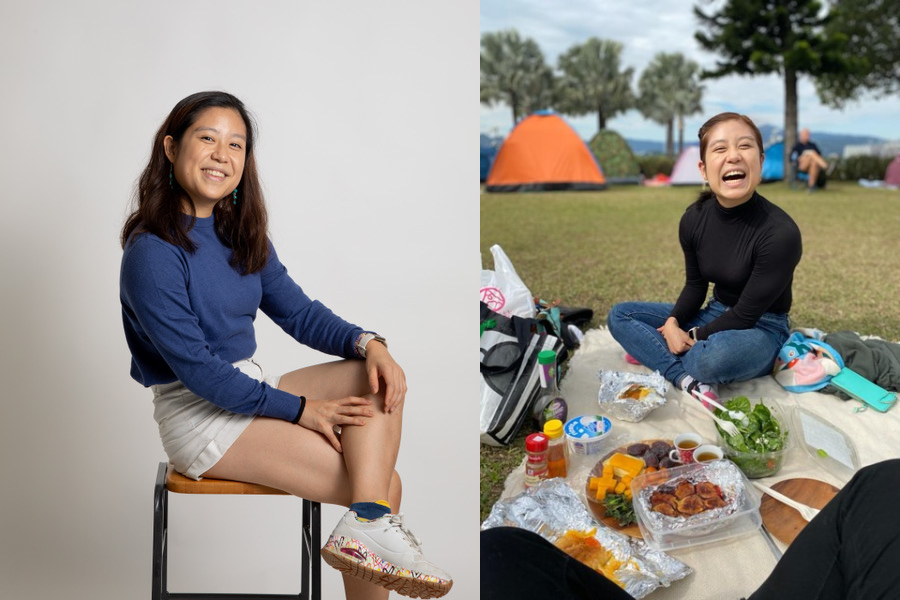
Steph is the founder of Body Banter (@bodybanter), a Hong Kong-based registered charity that works with young people to start conversations about body image and mental health. She is currently pursuing her PhD in a joint program between The University of Hong Kong and Mind HK (@mindhongkong), a local mental health charity. Integrating her knowledge of psychology and linguistics, she aims to encourage people in Hong Kong to start challenging but necessary conversations about mental health and mental illness. Her work is internationally recognized and has been featured on media platforms such as BBC, Channel NewsAsia, Tatler Asia, NowTV, and Deutsche-Welle.
What is emotional well-being?
Hong Kong women are faced with a conundrum regarding how their bodies are ‘supposed’ to look and how they can present themselves as ‘good’ and ‘successful’ women – I learned this in a study1 I conducted with Chinese young adult women about navigating food and body concerns. A lot of us are accustomed to being told we should eat more to show respect to our elders, while simultaneously being told that we should micro-manage our eating habits to achieve a thin body which, in our society, is viewed as a representation of discipline and success. I think finding emotional well-being for women is understanding that we can sit in the driver’s seat and decide how to interpret and act on conflicting messages about who we can and ‘should’ be. For example, say we receive a well-intentioned but hurtful comment about our bodies from a family member. Instead of dwelling on emotions of guilt that may arise, we can decide to acknowledge their good intentions while reminding ourselves that our worth does not depend on one person’s one-off perception of us.
How can women attain emotional well-being?
I’m going to speak to this question from the perspective of improving our relationship with our bodies. Learning about alternative ways to approach our bodies – aside from the critical approach pervasive in diet culture messaging – can be helpful.
- Body positivity refers to the idea of celebrating how your body looks, regardless of perceived flaws.
- Body acceptance invites us to acknowledge that we can’t realistically feel positively about our bodies all the time, but that we can nonetheless accept them.
- Finally, body neutrality encourages us to focus on what our bodies can do, like swimming and taking walks with our friends, instead of what they look like.
Importantly, there is no ‘correct’ approach here – these approaches are more like ingredients that you can mix into the batter of your own unique body image approach. Changing the ways we approach our bodies won’t happen overnight, but we can take brave first steps in building awareness and re-evaluating the harsh ways that many of us interact with our bodies (just think about how we often talk about ‘burning’ calories or getting ‘shredded’!).
How to contact Stephanie Ng: Website – Instagram – Linkedin – Facebook.
Avril Rodrigues — Social well-being
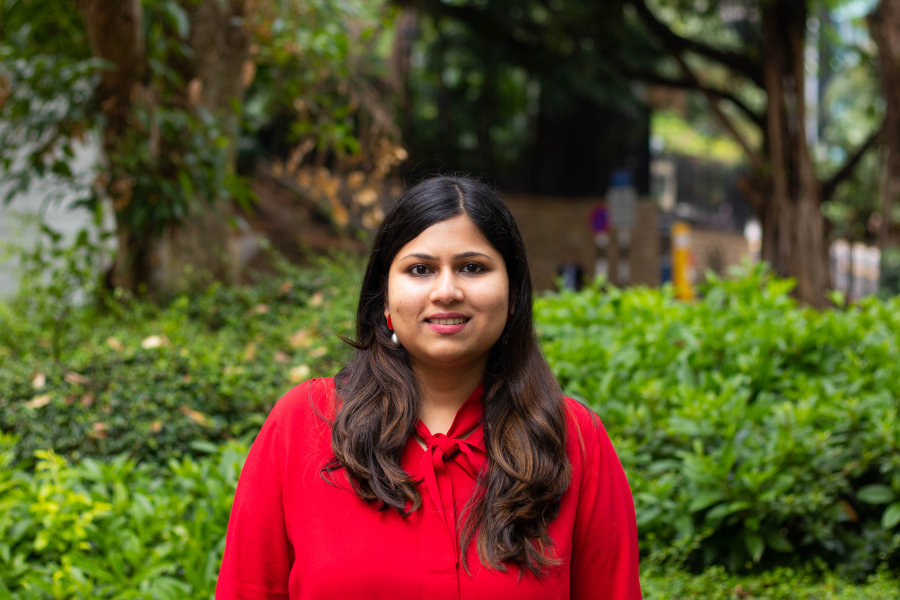
Avril leads Communications and Development at HELP For Domestic Workers, a nonprofit organization in Hong Kong (read more about HELP). Over a decade, she has worked with organizations in Hong Kong and internationally, focusing on developing organizational strategy, communications, and building partnerships. Avril has a Masters’s degree in Finance. She was born and raised in India and moved to Hong Kong five years ago.
For me, social well-being is not only about individual well-being and connecting with others, but also about having the ability to contribute meaningfully to the communities we serve. Maintaining nurturing relationships with family, friends, and colleagues also helps us feel more connected and fulfilled.
Working in the not-for-profit sector, I interact with vulnerable communities, especially women, who face hardships and struggles on a daily basis. At times, this affects me, and I experience mixed emotions like sorrow and grief and exasperation for what these women are going through. Building and investing in a support system to lean on makes me more resilient. Also, by giving back to our communities, we improve our own social well-being and contribute to the well-being of those around us.
Women play different roles at different junctures in their lives and communities. Their social well-being is a complex concept encompassing various aspects of a woman’s life. In many societies, women have been conditioned to care for the family and the extended community.
Taking time out for oneself while building a positive support system can be helpful. Community involvement can be an excellent way for women to meet new people and make a difference. This can include volunteering, joining a club or organisation, or attending community events. Women can also seek personal and professional support like therapy, counselling, or coaching. We also need to create a culture of respect for women’s contributions and experiences and empower them to make decisions that affect their lives.
How to contact Avril Rodrigues: Website – Instagram – Linkedin – Facebook.
Dhwani Desai — Intellectual well-being
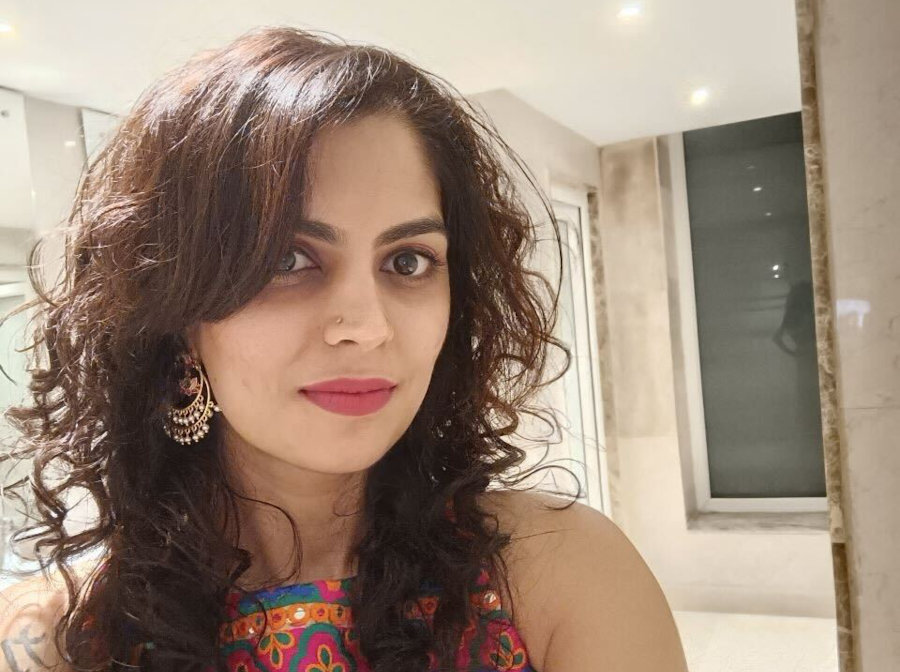
I am a 38-year-old woman who lives in Bangalore, India. I work as a journalist, and have over 15 years of experience in the field. I am a mother to a toddler, so in recent years, although I haven’t taken a break from my profession that has lasted over a couple of months, the way I work has changed drastically, since now I work full-time from home.
What is intellectual well-being?
Encouraging the use of one’s creativity, knowledge, and experiences, and to be able to positively put them in action. Intellectual well-being is anything that helps a person enrich their intellectual sphere, be it through having a space where one can explore their interests, learn new activities, acquire new skills, be exposed to cultural activities, meet other people with whom you can have enriching conversations and get some takeaways, and be involved at the community level. It also means having a space where one can find means to grow in their profession.
How can women attain intellectual well-being?
I believe women can strive for intellectual wellness by actively finding clubs or other venues that foster an exchange of ideas and talent. A big role in this is having a safe space for women to be able to express themselves and their desires. What would also help is having one place where women can seek out mentors that they can trust and look up to to guide them in their professional journeys. Many times, due to the changing roles of women – from a professional, to a married professional, and then a married professional with kids – it becomes hard to get the relevant information you need to move ahead in your career. This can work as a huge deterrent in moving ahead in your profession, or even finding a creative outlet where you can apply your talent and skill.
How to contact Dhwani Desai: Linkedin.
Benita Chick — Environmental well-being
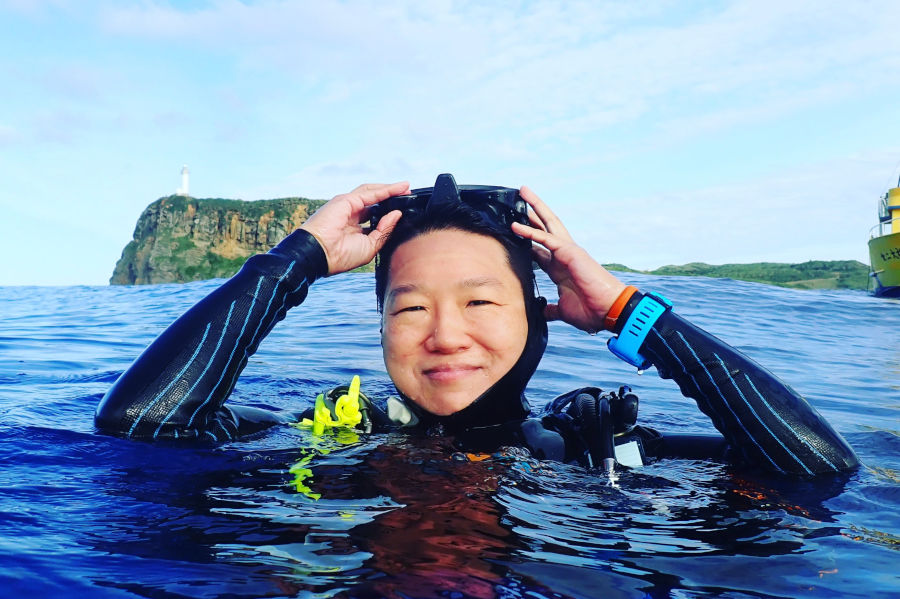
Benita founded Encompass HK, a social enterprise in Hong Kong that focuses on the Sustainable Development Goals, in 2018. She is passionate about the environment and is a scuba diving instructor. Benita teaches part-time on sustainability at The University of Hong Kong, and is a Board Director at the KELY Support Group and Youth Arch Foundation.
What is environmental well-being?
Environmental wellness is a sense of safety, comfort, and positive connection/feelings with one’s surrounding environment. Our personal space directly affects our physical, mental, emotional wellbeing and in turn, impacts productivity. Broadly speaking, environmental wellness also extends to our community, country, and planet.
How can women attain environmental well-being?
Women, especially, experience many hormonal changes which can affect their wellbeing in several ways. Hence, it is important for them to attain environmental wellness by keeping their home devoid of toxins and ensure its safety and comfort. They may also participate in cleanliness drives, tree planting, ecotours, or other communal activities to elevate the environment they live in.
How to contact Benita Chick: Website – Instagram – Linkedin – Facebook.
Corie Chu — Spiritual well-being
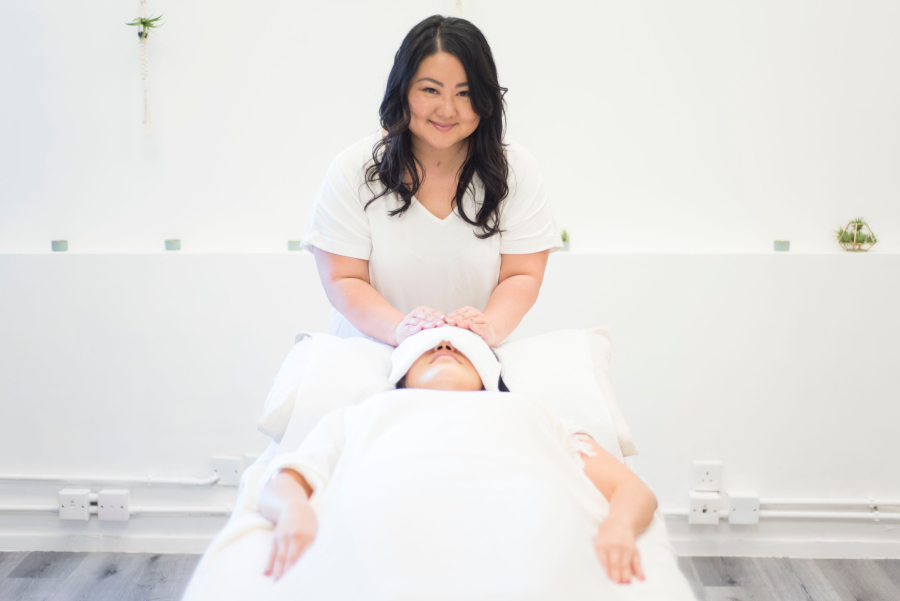
Corie is a Reiki Master Teacher, Numerologist, and Intuitive Energy Healer who specializes in emotional healing and emotional release via energy work. She supports many amazing women (and men) to help them connect better with themselves, manage stress, or wish to heal and release overwhelming emotions such as anger, anxiousness, frustration, sadness, and grief.
She also works with individuals of all ages and conditions such as acute and chronic pains/inflammation, illnesses, and diseases such as cancers, PCOS, endometriosis, gut issues, fertility issues, thyroid disorders, sleep disorders, chronic anxiety, and depression. Her studio, Corie Chu Healing is located in Central and she also provides remote distant healing sessions.
What is spiritual well-being?
Spiritual well-being is a form of personal connection to consciousness. The deeper and more easily we’re able to connect to our true self, our heart, is a way to measure how healthy our spiritual well-being is. How we live, breathe, think, behave, react, face our fears, our ability to accept ourselves, and our desire to do better in a heart-centered way so that we can evolve as an individual. It may include learning and practicing mindfulness, self-compassion, self-awareness, self-acceptance, and self-love, with the goal to awaken and live meaningfully so we can achieve our life purpose.
How can women attain spiritual well-being?
Self-reflection practices are a great way to develop/connect with our spiritual well-being better. What went well and what didn’t go so well today? Notice what the inner voice is saying. How does it make you feel? Check if that voice is coming from you, or is it from someone who has a heavy influence on you. Notice your emotions, your breathing, your thoughts (any spirals?), your bigger reactions to someone’s comments, and how your body feels (any pains, discomforts, blockages?) Be honest. Accept them. What kind of changes do you wish to make? Develop from there and don’t be afraid to look for tools and external support to help you along too.
How to contact Corie Chu: Website – Instagram – Linkedin – Facebook.
Noorulain Yousaf — Occupational well-being
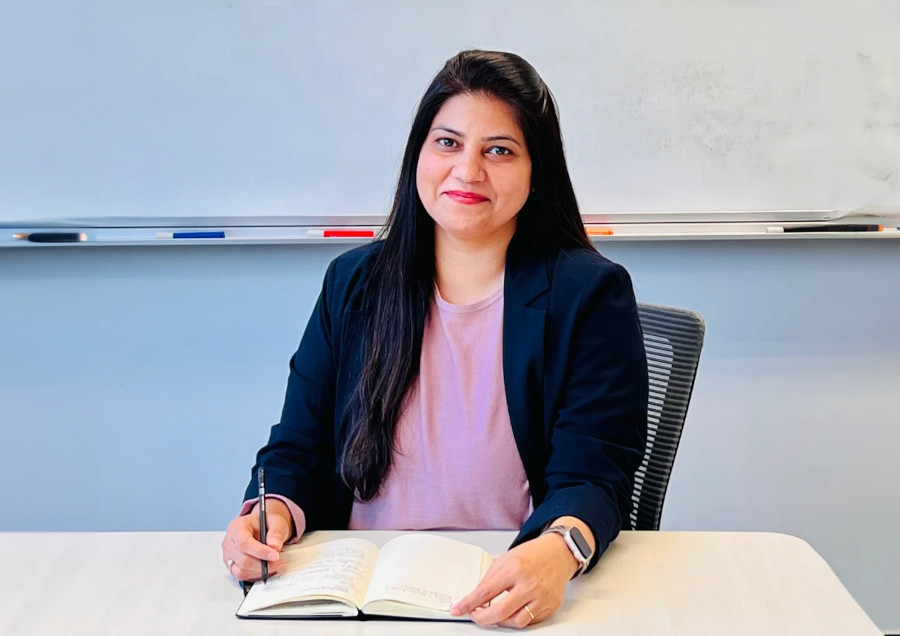
Noorulain is a facilitator and coach with certification credentials from International Coaching Federation (PCC – ICF). Her areas of specialty are career, transitions, and teams. Prior to embarking on a coaching journey, she worked in the corporate sector in Pakistan and Hong Kong with roles covering equity investment research, financial product development, talent development, HR Recruitment, and learning & development. Her core values are learning, curiosity, balance, excellence, and equality. Noorulain calls herself a global citizen and is currently based in Hong Kong with her husband and two children. She likes to volunteer at a local food charity and is a student of neuroscience, human behaviour, ESG, nutrition, and financial planning.
What is occupational well-being?
Occupational wellness is the state of equilibrium between our professional and personal lives that we all so desperately seek. It leads to self-actualization which in turn helps us to be more authentic, manage stress better, and build fulfilling relationships.
COVID-19 has brought about a much-needed change in attitudes around human resource practices. Organizations are creating well-being frameworks, flexible work arrangements, and helping employees manage stress now more than ever. We should make the most of these opportunities and not be afraid to ask for help. On an individual level, using tools such as Maslow’s hierarchy of needs and Wheel of Life model can help us manage priorities and maintain effective weekly calendars.
How can women attain occupational well-being?
My work with women professionals has shown that most of the times, it’s one of the following issues that can lead to feeling overwhelmed:
- Not saying “No”;
- Struggling to delegate effectively;
- Not asking for help.
Do a self-assessment and start observing your behaviour in both personal and professional areas. For example, if you are struggling with delegation at work, it is most likely that you are also not able to delegate simple tasks at home. Find role models at work and have a conversation with them about balance and what it means for you. Best of luck!
How to contact Noorulain Yousaf: Website – Linkedin – Facebook.
Cristina Jaeger — Financial well-being
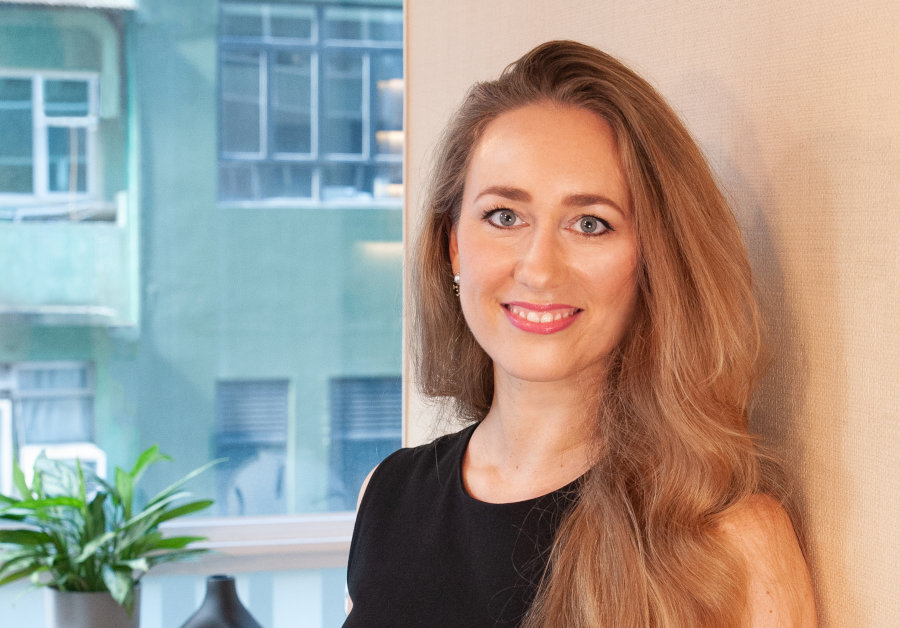
With over 10 years in Wealth Management across Europe and Asia, Cristina Jaeger is an expert in helping clients reach their financial goals. When confronted not just with the frustratingly bleak statistics of women’s (financial) independence, but also the lack of financial confidence and knowledge in her female networks, Cristina applied her finance experience to create herFinancialFreedom. Her programme, 90 days to Financial Freedom, is a 3 months-course that helps you define your financial goals, understand your current situation, explain financial principles, and equip you with the knowledge and confidence needed to be truly financially free!
What is financial well-being?
For me, financial wellness goes beyond just being a state where individuals have control over their current and future financial situations; it is about financial freedom. Especially for women, who have historically been kept out of financial spaces – be it on the trading floor or making personal or family financial decisions – having the knowledge and ability to shape their finances is essential. It starts with having financial goals, from paying off debt to saving for retirement, and then effectively arranging your finances, through saving, budgeting, and investing, to achieve them. Financial wellness and financial freedom allow a woman to live life without the stress, anxiety, and tension of not having enough money when needed.
How can women attain financial well-being?
The steps to financial wellness and freedom can be quite daunting at first. Having worked with women for over 10 years in wealth management in may countries, the number one thing that needs to change is the mindset. Only 28% of women globally feel confident about investing! Mindset can be shifted only when there is knowledge, so I believe increasing financial literacy is key. If you’re ready to take your financial well-being to the next level, start reading and learning about financial basics. This is why I created a community of women interested in learning how to improve their financial situation. In addition to learning together, a community or buddy system is great for accountability.
How to contact Cristina Jaeger: Website – Instagram – Linkedin – Facebook.
- Ng, S., Liu, Y., Gaither, S., Marsan, S., & Zucker, N. (2021). The clash of culture and cuisine: A qualitative exploration of cultural tensions and attitudes toward food and body in Chinese young adult women. International Journal of Eating Disorders, 54(2), 174-183.
Header image credits: The HK HUB


